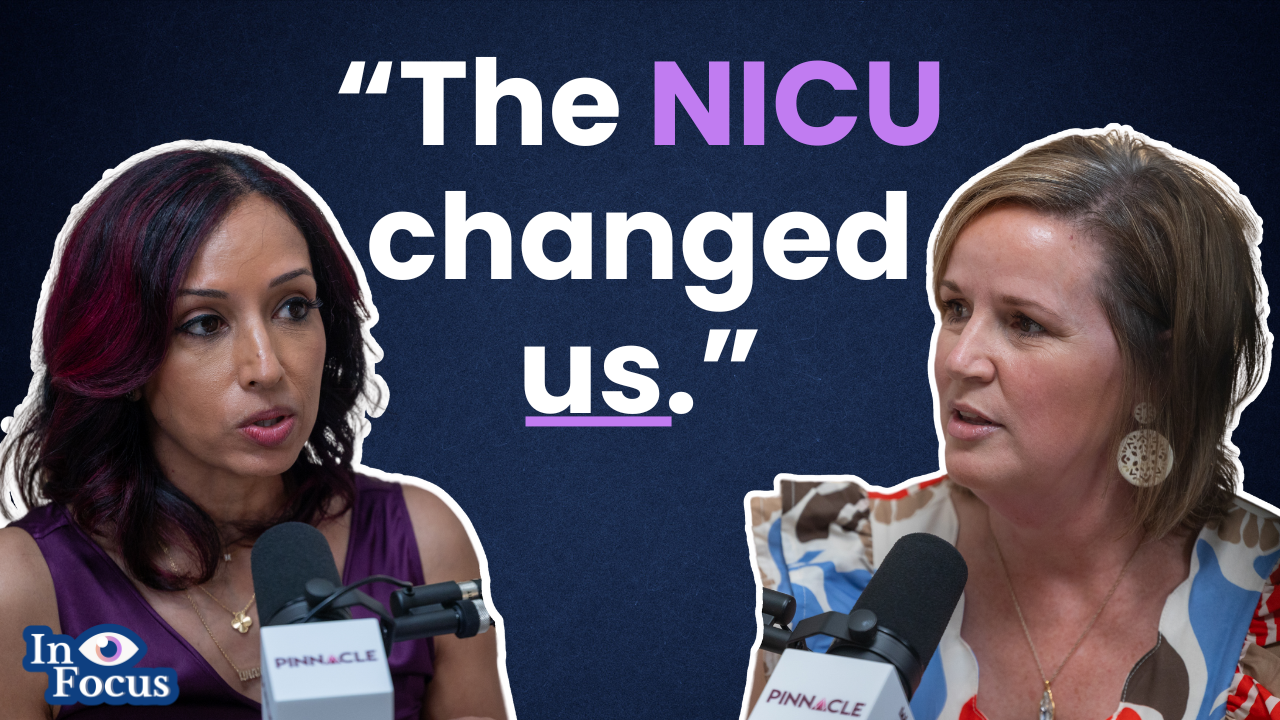What No One Tells You About the NICU: A Mom’s Honest Story of Strength and Survival
Listen On
What Every NICU Parent Deserves to Hear
From Dr. Rupa Wong | In Focus Podcast Recap
When you’re a pediatric ophthalmologist like I am, you get used to the beeping of NICU monitors. You learn how to navigate around IV poles and swaddled incubators to perform delicate eye exams. But no matter how many exams I do, I never forget the parents. The ones sitting quietly beside their babies, trying to make sense of a world they never asked to be thrown into.
That’s why this week’s episode of In Focus hit so close to home. I sat down with Kathryn Whitaker—award-winning author, NICU advocate, and mother of six—whose son Luke spent 14 weeks in the NICU. Kathryn has lived the NICU experience in all its complexity: the uncertainty, the fear, the guilt, the grief... but also the deep love, the advocacy, and the resilience.
And she shared something that I think every NICU parent deserves to hear.
The Reality of Life in the NICU
When Luke was born, he weighed just over three pounds. By day nine, he was diagnosed with necrotizing enterocolitis—a life-threatening intestinal infection. Over the next four years, Luke would undergo 10 surgeries and see 18 specialists. His family’s life was completely restructured by his medical needs.
And yet, what Kathryn remembers most vividly isn’t just the procedures or diagnoses—it’s the emotional toll. The feeling of trying to be in two places at once: at the NICU bedside and at home with her other children. The impossible juggling act. The deep-rooted guilt. The loneliness of a private hospital room.
If you're a parent who’s been there—or are there right now—Kathryn said it best: You don’t have to happy-clap your way out of it. You’re allowed to feel what you feel. You’re allowed to ask for help. And no, it doesn’t make you any less strong.
What I Wish More Families Knew About Eye Health in the NICU
As a pediatric ophthalmologist, one of my roles in the NICU is to screen for retinopathy of prematurity (ROP), a potentially blinding condition that affects the eyes of premature infants. These exams are brief—but I know they can feel invasive and overwhelming for families.
I usually enter quietly, accompanied by a nurse, close the curtain, and explain what I’m about to do. Most parents don’t want to watch (and I completely understand why). But what I didn’t fully grasp—until I became a parent myself—is how emotionally charged those few minutes can be. You’re not just waiting for results. You’re holding your breath. Hoping. Bracing. Wondering what’s next.
That’s why, beyond just the exam, I try to offer reassurance. And I remind every NICU parent: you are your baby’s best advocate. Even when you feel out of your depth. Even when you don’t have a medical degree. You know your baby better than anyone.
Lessons in Advocacy, Grace, and Letting Go
Kathryn talked about learning to relinquish control—something that does not come easy to Type A moms like us. But in the NICU, where control is a luxury you don’t always have, she learned how to focus on the next right thing.
She also learned how to advocate with love. Not with anger, but with clarity: “This nurse isn’t the right fit for our family.” “Can we skip the 3am bottle check tonight?” “Can someone I trust be in the OR with him?”
And when she asked for help—whether from friends, NICU mentors, or even a marriage counselor—it changed everything. She gave herself grace, which allowed her to show up more fully for her children.
Resources That Didn’t Exist 15 Years Ago
Kathryn now works closely with Hand to Hold, a nonprofit that connects current NICU families with seasoned NICU mentors. They also offer:
Free peer mentorship (nationwide)
NICU family podcasts
Bereavement support
Counseling services
Resources for dads, siblings, and grandparents
NICU parents: you are not alone. If you need someone who understands, please explore these tools. And if you’re a medical professional, consider how we can better meet parents where they are—by asking questions like, “What would make this less scary for you?”
One Final Thought
Whether I’m doing a quick exam or performing laser treatment for ROP, I try to remember: I’m stepping into someone’s hope and heartbreak. A parent’s entire world.
And if you’re that parent—exhausted, scared, grieving the “normal” you thought you’d have—I hope you feel seen. Your story is worthy. Your instincts are valid. Your love is powerful.
And just like Kathryn’s son Luke, your baby is more than their diagnosis. They are a story in the making.
Want to Learn More?
This is just the beginning. In upcoming episodes, we’ll explore:
-How screen time and digital habits are shaping our kids’ development
–The connection between vision and overall health
–What you need to know about common eye procedures like LASIK and cataract surgery
–Practical ways to advocate for your child’s visual needs
You can subscribe to my podcast, In Focus, anywhere you listen—or follow along on Instagram for updates and tips.
Watch this episode on Youtube right now!
Thanks for reading—and for doing what you can to protect your child’s vision, one step at a time.
– Dr. Rupa Wong
Pediatric Ophthalmologist | Surgeon | Mom of 3
This episode is brought to you by The Pinnacle Podcast Network! Learn more about Pinnacle at learnatpinnacle.com



